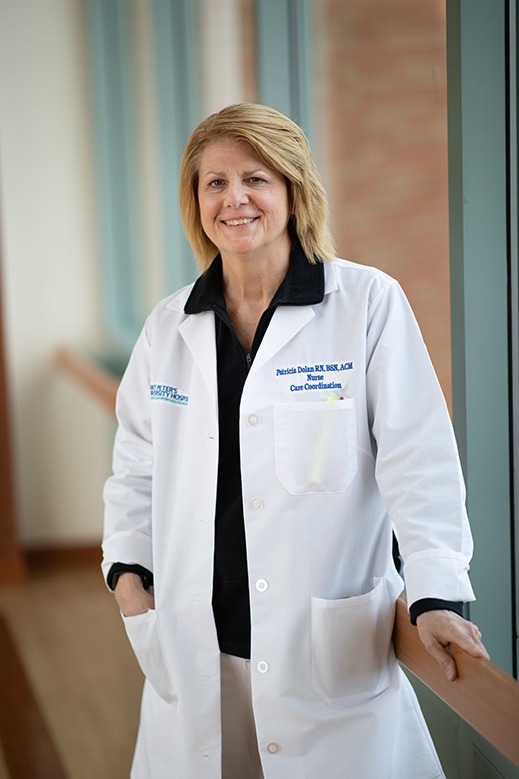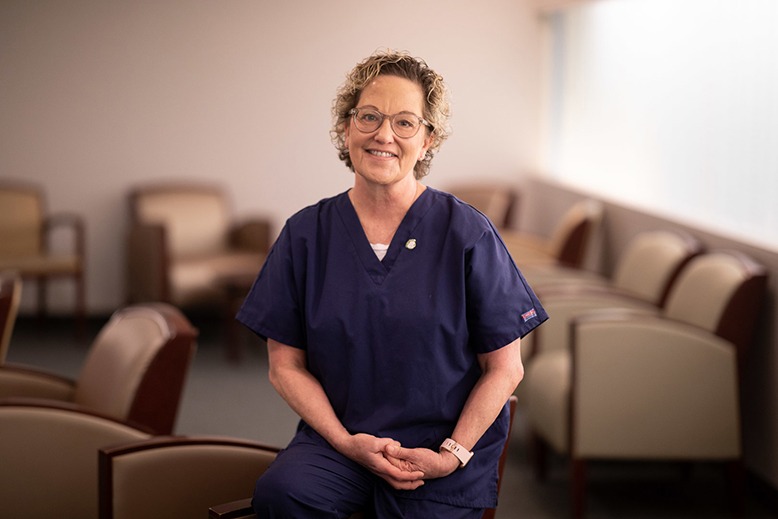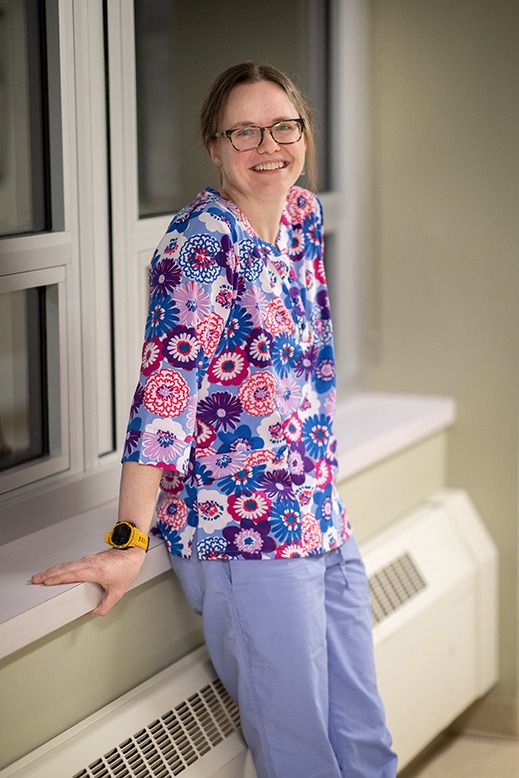READ MORE:
• DAISY Foundation Award Winners
• C.A.R.E.S. Award Winners

Photo by John O’Boyle
Patricia Dolan | RN-BSN, ACM
MEDICAL/SURGICAL
Saint Peter’s University Hospital, New Brunswick
For many patients, leaving the hospital can feel like the beginning of a frightening, unguided medical odyssey. “Patients always want to go home, but is it smart and safe to leave?” says Patricia Dolan, a medical/surgical nurse at Saint Peter’s University Hospital in New Brunswick. “Do they have an advocate, a family member that can ensure they are going to a safe and supported environment?” Answering these questions, setting up home care and allaying fears are all part of the discharge planning Dolan offers as a care coordinator. Dolan, who attended nursing school at Saint Peter’s, has had a 25-plus year career at the hospital. “Since I was a little girl, I always wanted to help people,” she says. “I’ve never regretted my career choice. It has given me lots of opportunities to learn and grow.”
Dolan, whose role starts at admission, is on hand throughout a patient’s stay, reviewing their chart, staying abreast of insurance parameters, and serving as an information resource for patients and families to assure a seamless transition back home. To that end, Dolan works with the patient’s team of primary-care nurses, social workers and administrators. “I couldn’t be successful without the team,” she says. “Everyone does their part.”
Dolan navigates the full range of complexities for each patient’s discharge, which can include setting up home-care providers (visiting nurses, therapists, etc.), arranging for medical supplies and medication deliveries, and making doctors’ appointments. “The details are important. It’s all about preparation and anticipating needs,” says the Old Bridge resident. “The patient can feel bombarded with information, so I explain and answer questions all along the way. I write everything down for them, so they don’t have to worry about forgetting. I try to treat everyone as if they are my mom or dad.”
—Deborah P. Carter

Photo by John O’Boyle
Sean Lyon | RN
MEDICAL/SURGICAL
Hunterdon Healthcare System, Flemington
Sean Lyon has a special therapy for his patients: laughter. “You can’t joke with everybody,” says Lyon, “but if you can make somebody laugh, maybe they’ll take their mind off [illness]. They’ll definitely feel better for it.”
Lyon learned the power of laughter while serving in Iraq as a medic in the Marine Corps. “You basically deal with the fact that you can die, and it’s a serious thing,” says Lyon. “But to make it so that you don’t mentally break down, you’ve just got to laugh it off.”
While in the Marines, Lyon recognized his passion for the medical field. When his platoon rescued an Iraqi civilian who had been imprisoned in a bunker and tortured, his team nursed the man back to health.
Lyon, who grew up in California, returned to civilian life and earned his nursing degree. He now resides in the Hunterdon County borough of Lebanon. At Hunterdon Healthcare, he combines the skills he acquired in the military with those he learned in nursing school and additional qualities he’s picked up on the job.
“I had a staff sergeant that would be like, ‘Here’s what you do: you take a little bit of something from everybody and make it your own.’ So I guess what I’m saying is that you take a little bit of all the people, especially the nurses around me, and kind of make your own product.”
A big part of Lyon’s product continues to be the humor he uses to help patients deal with often critical health issues. “You’ve got to learn how to soften that up,” he says.
—Royal Thomas II

Photo by John O’Boyle
MaryBeth Ray | RN, BSN, CCRN
CARDIAC CRITICAL CARE UNIT
Hackensack University Medical Center, Hackensack
When MaryBeth Ray first pursued a career in nursing, it wasn’t some grand aspiration to heal the world; she needed security. “When I was younger, my father had lost his job, and every day I’d get up in the morning with my mother and we would talk about, ‘Where are the jobs?’” she recalls. “There was always a job for nurses.”
Ray, who was born in Passaic but grew up in Florida, stuck to her nursing aspirations. When she graduated high school, she enlisted in the Navy and worked in the medical corps before leaving the service in 1984 (ironically, because the Navy didn’t need any more nurses).
She eventually returned to New Jersey and received a nursing degree at Bergen Community College before settling in at Hackensack UMC’s Cardiac Critical Care Unit. She has worked there for more than 30 years. Ray also married and raised two sons, Dylan and Kyle. That has helped her understand the importance of the family component in patient care.
“The bedside can be difficult. But if you listen, and you help the family understand, and you treat them as your own—because, God forbid that one day may be your own—it makes it better,” she says. “It makes it better to adapt and better to do your job.”
Ray found the security she longed for, but she also has achieved decades of providing something special for those in her care. “There’s a lot to be said for someone who’s very educated at the bedside,” she says. “But there’s also room for kindness and integrity.”
—Royal Thomas II

Photo by John O’Boyle
Lidya Gebrekidan | RN
FLOAT POOL
Clara Maass Medical Center, Belleville
Lidya Gebrekidan had a patient who was in need of constant care and had been admitted multiple times to Clara Maass Medical Center. The patient—whose woes were due to a recent colostomy—could walk and function without help, but still needed to be kept under watch. Sensing the patient’s frustration with the long healing process, Gebrekidan knew she had to do something to improve the situation. She went home, thought about ways to address the patient’s issues, and came back with a novel care plan.
Such attention moved the patient to nominate Gebrekidan for a DAISY Award. “I have been a patient more times than I can count and never have I had a nurse who exemplified so much care about my healing, care, and comfort,” the patient wrote about Gebrekidan. “I will never forget her and how she cared for me during a very difficult time.”
Gebrekidan’s compassion for her patients is deep-rooted. She moved to the United States from Ethiopia 12 years ago, and was impressed by the health-care system here. She knew she wanted to be part of it.
“Growing up, we didn’t have a doctor to see,” Gebrekidan says. “The only time you would go to clinic or the hospital is if you got sick, and you were lucky if you could be seen by a doctor. These kind of things made me want to be a nurse.”
Gebrekidan received her nursing degree from Seton Hall University four years ago and has been a practicing nurse ever since.
“I love helping people,” says the Jersey City resident. “Being able to get someone to feel better, or get them better, is an amazing feeling.”
—Ariana Baio

Photo by John O’Boyle
Dan Schowgurow | MSN, RN
MEDICAL/SURGERY
Virtua Marlton Hospital, Marlton
Dan Schowgurow’s philosophy of nursing is simple: Treat each patient as if he or she were a family member or friend. And people take notice. A family member of one of Schowgurow’s patients wrote in a letter, “He was so incredibly sweet and kind to my 95-year-old mother. He comforted her in a way I can only describe as how he would have taken care of his own mom.”
Schowgurow had worked in sales for more than a decade when he switched careers to nursing 12 years ago.
He had always loved interacting with new people, but grew tired of the sales quotas. After reading a newspaper article about the search for compassionate people to join the nursing work force, he decided to give it a try.
“I haven’t looked back since,” he says. “I’ve been very happy with my decision.”
In addition to working with patients, Schowgurow became an adjunct clinical instructor at St. Francis School of Nursing in Trenton in January.
He instructs students on how to interact with patients, look for potential dangers, and to handle all situations safely. It’s work he greatly enjoys.
When working bedside, no two days are the same. Schowgurow treats a variety of patients, including those recovering from surgery and others with chronic issues.
For Schowgurow, the “emotionally rewarding nature” of nursing outweighs the physical toll of long, tiring shifts. He says a day when he has done everything he could for his patients is a good one, no matter what.
“Nursing is a really hard profession, but it makes a difference in a lot of people’s lives,” he says. “Ultimately, it’s the ‘hard’ that makes it great.”
—Shea Swenson

Photo by John O’Boyle
Lauren Stroh | BSN, RN, CHPN
PALLIATIVE CARE/IN-PATIENT HOSPICE
Morristown Medical Center, Morristown
A flip through nurse Lauren Stroh’s thick binder full of thank-you notes from patients and family members, a collection spanning her 19-year career, shows the impact of her work on so many lives.
As a new nurse, Stroh spent years in ICU surgical trauma units. Nearly two years ago, after growing tired of the fast-paced environment, Stroh started picking up hospice-care shifts in the Nancy and Skippy Weinstein Inpatient Hospice and Palliative Care unit and found her niche.
“I have a big passion for hospice now because I understand what patients have gone through, being on the acute side of things,” Stroh says. “It’s a really scary time for families, and we can really help through the transition from active treatment to comfort care.”
Stroh, currently completing a master’s degree in education at Ramapo College, juggles her bedside time with working with first- and second-year nurses in a training program. “It’s important for my generation to really support young nurses,” Stroh says. “We need them.”
Working the night shift, Stroh strives to put her patients at ease by making frequent rounds, making herself very available, and tactfully having honest conversations about what families and patients can expect. Hospice care is full of tension and uncertainty, and Stroh works diligently to create trust with her patients and their families and to provide them with any peace she can. “I always say it was a success if the family would say, ‘Thank God you’re here tonight so we get some rest.’ It’s an honor to be trusted,” Stroh says.
—Shea Swenson



